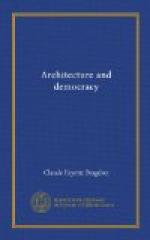In whatever way the war may complicate the architect’s personal problem, it should simplify and clarify his attitude toward his art. With no matter what seriousness and sincerity he may have undertaken his personal search for truth and beauty, he will come to question, as never before, both its direction and its results. He is bound to perceive, if he does not perceive already, that the war’s arrestment of architecture (in all but its most utilitarian and ephemeral phases) is no great loss to the world for the reason that our architecture was uninspired, unoriginal, done without joy, without reverence, without conviction: a thing which any wind of a new spirit was bound to make appear foolish to a generation with sight rendered clairvoyant through its dedication to great and regenerative ends.
He will come to perceive that between the Civil War and the crusade that is now upon us, we were under the evil spell of materialism. Now materialism is the very negation of democracy, which is a government by the demos, or over-soul; it is equally the negation of joy, the negation of reverence, and it is without conviction because it cannot believe even in itself. Reflecting thus, he can scarcely fail to realize that materialism, everywhere entrenched, was entrenched strongest in the camps of the rich—–not the idle rich, for materialism is so terrible a taskmaster that it makes its votaries its slaves. These slaves, in turn, made a slave of the artist, a minister to their pride and pretence. His art thus lacked that “sad sincerity” which alone might have saved it in a crisis. When the storm broke militant democracy turned to the engineer, who produced buildings at record speed, by the mile, with only such architectural assistance as could be first and easiest fished up from the dragnet of the draft.
In one direction only does there appear to be open water. Toward the general housing problem the architectural profession has been spurred into activity by reason of the war, and to its credit be it said, it is now thoroughly aroused. The American Institute of Architects sent a commissioner to England to study housing in its latest manifestations, and some of the ablest and most influential members of that organization have placed their services at the disposal of the government. Moreover, there is a manifest disposition, on the part of architects everywhere, to help in this matter all they can. The danger dwells in the possibility that their advice will not be heeded, their services not be fully utilized, but through chicanery, ignorance, or inanition, we will relapse into the tentative, “expensively provisional” methods which have governed the housing of workers hitherto. Even so, architects will doubtless recapture, and more than recapture, their imperiled prestige, but under what changed conditions, and with what an altered attitude toward their art and their craft!




